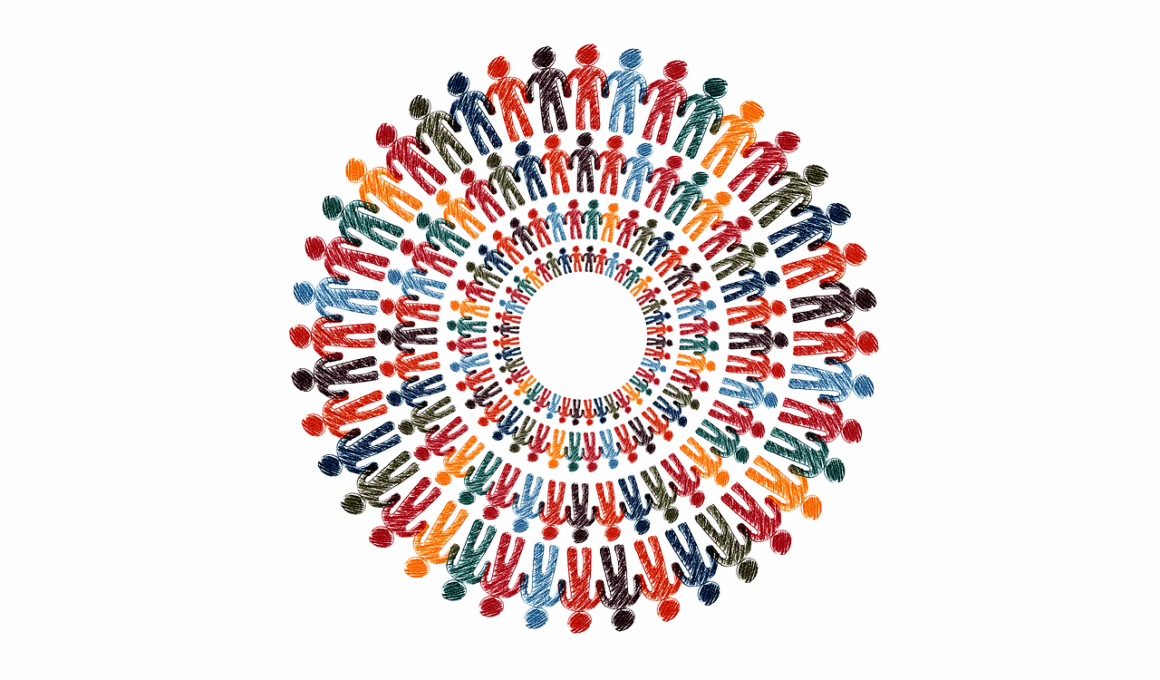Incorporating Diversity and Inclusion in Ethics Development
Diversity and inclusion play crucial roles in ethics training because they shape the perspectives that inform ethical decision-making. By integrating diverse viewpoints, organizations can foster an environment that encourages employees to engage more fully with ethical dilemmas. Recognizing the unique needs and backgrounds of all employees not only enhances creativity and innovation but also ensures that ethical guidelines consider a broader range of experiences. This comprehensive approach facilitates better understanding of how various factors impact ethical behavior. Additionally, diversity in teams contributes to balanced discussions that lead to well-rounded ethical frameworks. Encouraging open dialogue is essential for identifying ethical pitfalls that may arise from groupthink or conformity. Accepting and valuing diverse opinions helps diminish biases in the decision-making process, promoting ethical standards that reflect the collective values of the organization. Organizations should actively seek input from employees across different demographics when designing their ethics training programs. Inclusive ethics development will not only strengthen internal cohesion but also position businesses as socially responsible entities committed to fairness and equity. Ultimately, embracing diversity is not just an ethical obligation; it is a strategic advantage that empowers organizations in today’s globalized workspace.
Implementing diversity and inclusion in ethics training requires a multi-faceted approach to ensure that it resonates with everyone in the organization. To start, organizations should assess their current ethics training programs for inclusivity gaps. Surveys and focus groups can help identify whether employees from different backgrounds feel represented in existing material. Once these gaps are evident, companies can work on integrating diverse case studies and real-world examples into their ethics training programs. This allows participants to see how ethical challenges impact various communities and individuals differently, fostering empathy and understanding among employees. Furthermore, bringing in guest speakers from diverse backgrounds can provide invaluable insights into the intersection of ethics and different cultural experiences. The stories and experiences shared can serve to humanize abstract ethical concepts, making them more relatable and applicable. Additionally, leveraging technology to create interactive training modules can enhance engagement, allowing all voices to be heard. Tools like online discussion forums or breakout groups can promote collaboration and facilitate the sharing of diverse perspectives. Overall, effective implementation will require an ongoing commitment to diversity, with regular updates and assessments of training materials to continually reflect societal changes.
The Role of Leadership in Fostering Inclusion
Leadership commitment to diversity and inclusion is paramount in shaping an ethical organizational culture. Leaders need to walk the talk by consistently advocating for inclusivity in their practices and policies. This involves not only setting the tone for ethical standards but also actively participating in ethics training, thus demonstrating its importance to the entire organization. Leaders can further influence behaviors by sharing personal stories of ethical challenges they’ve faced and how diversity played a role in the resolution. This approach humanizes leadership and reinforces the message that ethical decision-making benefits from varied perspectives. Moreover, leaders should prioritize diversity in hiring and promotions, ensuring that decision-making roles reflect the diversity present within the workforce. Establishing accountability structures for diversity benchmarks can enhance the focus on inclusion across all levels. Regularly measuring and communicating diversity progress can build trust and commitment to the ethical values espoused by the organization. This bi-directional relationship between leadership and inclusivity not only strengthens ethical standards but also engenders loyalty and engagement among employees, resulting in a stronger organizational identity that aligns with social expectations and ethical responsibilities.
To effectively integrate diversity and inclusion into ethics development, ongoing training and reevaluation of practices are crucial. Ethics training should not be a one-size-fits-all approach; rather, it should be adaptable to the evolving needs of the workforce. Organizations should schedule frequent updates to their training modules and practices to account for new societal perspectives and ethical challenges. Another important aspect includes providing resources that support continuous learning, such as workshops, webinars, and literature on diversity in ethics. Employees should feel encouraged to discuss ethical dilemmas they encounter and propose solutions based on diverse inputs. Additionally, embedding allyship training within ethics development can cultivate a supportive environment, where colleagues help one another in navigating ethical situations. This promotes collective accountability and reinforces the notion that ethical practices are a shared responsibility among all employees. Furthermore, organizations could create systems that reward inclusive ethical behavior, thus incentivizing employees to engage actively in integrating diversity and inclusion into their daily practices. Continuous improvement should be a core tenet of ethics development, ensuring that ethical standards evolve in line with social progress and the increasing demand for corporate accountability.
Measuring the Impact of Diversity on Organizational Ethics
Measuring how diversity affects organizational ethics can be complex, but it is essential for understanding its true value. Organizations can start by implementing metrics to monitor the efficacy of their ethics training initiatives. Surveys can be used to gauge employee perceptions of inclusion and ethical behavior changes over time. Tracking diversity within internal ethics committees also provides insightful data on how inclusivity influences ethical decision-making. By analyzing incidents and resolutions of ethical concerns, organizations can investigate whether diverse teams demonstrate different approaches to ethical challenges. This data will highlight areas where diversity has enhanced the ethical landscape, allowing the organization to capitalize on successful strategies. Benchmarking against other organizations in the same industry can provide context and inspire innovative approaches to ethics training. Additionally, the retention rates of diverse employees can be a telltale sign of an inclusive ethical climate. Low turnover rates among underrepresented groups often reflect a welcoming and ethically supportive environment. Hence, comprehensive analytics are necessary not only to promote diversity but to integrate it within the ethical fabric of the organization, driving long-term success and respect in the business world.
Ultimately, diversity and inclusion in ethics training is not just about compliance; it’s about cultivating a workplace culture that champions authenticity and respect. Ethical organizations recognize that their most valuable asset is their workforce, which thrives on diverse voices and perspectives. By prioritizing ethical practices intertwined with inclusivity, organizations can navigate conflicts and challenges more effectively. When employees see their unique backgrounds valued, they’re more inclined to participate in ethical initiatives, encouraging a shared commitment to ethical behavior throughout the organization. This sense of belonging is vital as it fosters open conversations surrounding ethics, which often leads to innovative solutions to complex problems. Furthermore, striving for diversity in ethics promotes corporate social responsibility, enhancing the company’s image among consumers, clients, and stakeholders. Businesses that embed diversity and inclusion in their ethical frameworks demonstrate their awareness of the world’s complexity and their readiness to evolve alongside societal shifts. Thus, organizations that effectively weave diversity into ethics development turn ethical training into a powerful tool for organizational transformation, resilience, and competitive advantage. By committing to inclusivity, businesses not only comply with modern expectations but also pioneer a new era of ethics in the workplace.
Conclusion: Path Forward
The path forward for organizations integrating diversity and inclusion in ethics training lies in continual adaptation and authenticity. Being proactive in seeking to embody diverse perspectives will drive ethical culture that is reflective of societal values. Companies must make a genuine effort to engage with all employees and understand their experiences in order to create a training framework that speaks to their realities. Future ethics training can benefit from case studies that focus on real-world scenarios involving diverse teams, showcasing both successes and failures. This will allow employees to digest complex ethical issues while drawing connections between their experiences and those of their colleagues. Moreover, engaging with external stakeholders, such as community leaders and advocacy groups, can augment the richness of the training content and broaden understanding. The ongoing evolution of ethics development must encourage organizations to embrace change and prioritize inclusivity positively. By doing so, they can align their identities with contemporary ethical paradigms and define a new standard for accountability. Ultimately, fostering diversity in ethics training is essential for sustainable organizational health, ensuring that ethical considerations remain dynamic and relevant in an ever-changing environment.
Businesses, once siloed in their efforts regarding ethics and diversity, are now beginning to understand the critical link between the two. This recognition drives the need for a comprehensive approach that not only respects diversity but also champions it throughout the ethics development process. Inclusion must not be a mere compliance checklist but rather an inherent value taught and reinforced at every level. This mindset shift encourages active participation from employees, creating an environment where diversity can flourish. The belief that diversity ultimately leads to better ethical outcomes must be ingrained in the organizational culture. Flattering words and policies are no longer sufficient; true change requires action and commitment. When organizations actively listen to their employees’ diverse insights and perspectives, they can reshape their ethical guidelines to better reflect their workforce’s values. A workforce that feels heard and respected is more likely to embody the ethical standards put forth by their organization. The transformation of ethics from abstract principles to actionable frameworks illustrates the organization’s journey towards being truly inclusive. Therefore, fostering dialogue, conducting regular training, and prioritizing diversity are essential steps for cultivating a robust ethical culture that is prepared for the future.





